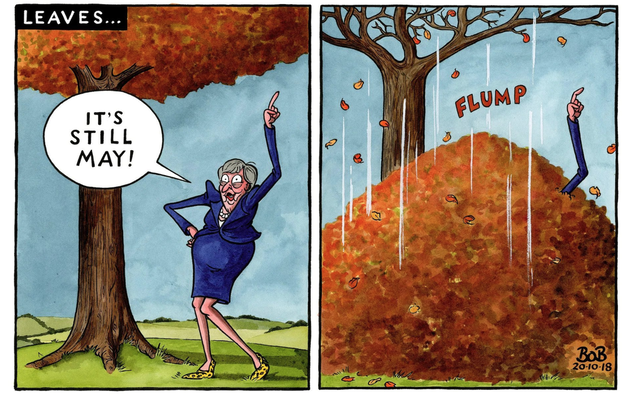|
Issue 12, Semester 1, 2019 EDGAR BOX In her speech on Friday announcing her resignation as British Prime Minister, Theresa May declared that it was in the best interests of the country for a new Prime Minister to lead the effort toward the United Kingdom’s departure from the European Union. These words reminded me of an old theatre expression, whose source I wish I knew. ‘Whether you are doing terrifically, or whether you are doing terribly, it’s never too early to get off the stage.’ It would have been well for the conservatives to have heeded this lesson earlier. If May hopes that her exit might pave the way for another leader to finally negotiate a new relationship between Britain and the EU, more in line with the UK’s nationalistic interests, then whenever the appropriate moment to step aside actually was, June 7th 2019 is by far, too late. Now, in all fairness, the degree of May’s personal culpability for failing to deliver the Brexit promise is open to debate. Whilst her ideological inflexibility and poor grasp of political tactics did her no favours when trying to manoeuvre her parliament into line or when confronting the EU’s negotiators, the fundamental problems besetting May weren’t her skills at diplomatic poker, but the recalcitrance of the parties on either side of the English channel — a reality which does not change with her resignation.
On one side, the British Parliament, still riven by the divide between the pro and anti-Brexit factions, has categorically rejected the withdrawal agreement negotiated between May’s government and the EU three times. With so much daylight between the agreement on offer and the expectations of the British hardliners, it’s hard to see at this stage what additional modifications that could fit within the negotiated framework could suddenly tempt them to pick the middle ground. An eleventh-hour sanity check from the no-deal crowd — as the prospect of a hard departure with its attendant impacts begins to solidify — seems unlikely, as the results of the European Parliamentary elections and the massive swing to Nigel Farage’s Brexit Party scare conservative MPs into the belief that a hard line Brexit is the only viable platform for electoral survival on the right. On the other side, the European Union has been adamant that no other offer is on the table. As recently as Saturday it has reiterated that it will not revisit negotiations, and has not changed its ‘no cherry-picking’ position over the past three years — that it will not allow the UK to selectively choose what benefits to retain without guaranteeing the unimpeded movement of goods, capital, services and labour. Nor is it likely to extend the current October 31st deadline for the UK to decide on whether to ratify the agreement or automatically trigger a hard exit. For Brussels to stay its course, it needs only to satisfy itself of the persuasiveness of a simple Machiavellian calculus: that the harms suffered by Britain via a hard Brexit will dissuade other states from seeking their own renegotiations, and that the benefits of this deterrence will outweigh whatever economic impacts the EU will bear itself. The only likely outcomes now are the polar extremes: a hard Brexit without a negotiated withdrawal, or a last-minute decision to remain. The hard break supporters have the easier task, as all they need to do is dig in their heels and run out the clock. However, it is not impossible to see a resurgence of the pro-European side of the debate; whatever the mandate delivered by the 2016 referendum actually was, it has since become a palimpsest, seeing a narrow but steady majority of the public disillusioned with the Brexit fairy tale they were sold. With the hardening of the conservatives, it’s unlikely that a new Tory leader wanting to pass the deal could win the parliament they want — although they could definitely lose it. A snap election called in the hopes of hammering parliament into a shape capable of breaking the deadlock, could always see enough exit voters staring down the barrel of a hard Brexit lose their nerve to swing the House to the remain option. Whatever the outcome, it is doubtful that whoever May’s replacement turns out to be will be able to do much more than flick the electoral light switch. The trajectories of all the key players have already been set, independently of whoever actually resides at 10 Downing Street. Any attempt to alter their momentum would have needed to have begun over a year ago, not mere months before the deadline. With no better deal to pull out of a magician’s hat – the next Prime Minister will be left with the task of sticking an impossible landing. However they may perform, it is likely to be deeply unpopular. If the pro-EU faction wins and the UK remains — they’ll be the leader who let down their party during the home stretch of a three-year marathon, on the defining issue of their Prime Ministership. If a hard Brexit occurs, they’ll be the PM who merely stumbled ineffectually across the finish line, stuck in the same holding pattern that May was unable to escape. Whichever result, odds are that they won’t pull a surprise checkmate in a game of four-dimensional chess between players who are committed to not compromising. Edgar Box is a Second Year JD Student. Comments are closed.
|
Archives
October 2022
|



